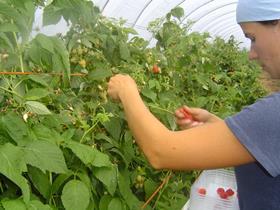
Ministers are considering a permit system for low-skilled migrant workers, which could resemble the former Seasonal Agricultural Workers Scheme (SAWS).
The Migration Advisory Committee has claimed that both the number of migrants and the amount of time they spend in Britain could be controlled using a permit system.
And head of the committee Sir David Metcalf has suggested the permit system could be modelled on a previous permit system used under SAWS, which was done away with in 2013.
Under the abolished programme, British fruit and vegetable growers were allowed to employ migrant workers from Bulgaria and Romania for up to six months at a time, with workers being counted in and out.
John Hardman of Hops Labour Solutions reacted to the news with “cautious optimism”, saying the move could be “extremely positive”.
“The Home Office has run a cost-effective and efficient scheme in the past and there’s no reason why that couldn’t be reintroduced in a similar format in a reasonably timely fashion,” he said.
According to the recruiter, the industry is already facing a shortage of good quality workers and Hardman is hopeful that a permit system would begin to address this problem by tying workers to agricultural jobs for restricted periods of time.
Part of the problem with the current system is that many migrant workers, who originally come to UK to pick fresh produce, then move on to other industries. A system, which limits this movement would be beneficial to the UK’s fresh produce industry, Hardman believes.
“Numbers are not an issue but the quality of worker is becoming an issue across sectors – whether it be in soft fruit or in vegetables,” he said. “The workers we’ve had in previous years have now moved to other industries such as hospitality, construction and catering – nicer jobs if you like.
“At the moment the industry doesn’t have a succession plan about where our next tranche of seasonal labour is going to come from.”
Hardman also believes that a scheme which limits the duration of a worker’s stay in the UK – as SAWS did – could prove effective as it will make workers more efficient.
“There are only so many months of picking you can do before you keel over,” he said. “What SAWS did was give us a consistent supply of new, fresh and efficient labour and with the margins that our growers are under pressure with, efficiency is absolutely paramount.”
He stressed that from a currency point of view, the UK is still far more attractive to workers than the Eurozone despite the post-Brexit devaluation of the pound, but said it is important to make any permit system as simple to navigate as possible so as not to deter workers.
The deliberation of a permit system coincides with the announcement today of the first official migration figures since the EU referendum. Net migration estimates were at the near-record level of 327,000 for the year to March.



